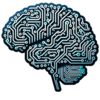
Back الذكاء الاصطناعي في المجال الصحي Arabic Intel·ligència artificial en el camp de la salut Catalan Künstliche Intelligenz in der Medizin German Inteligencia artificial en el campo de la salud Spanish Tehisintellekt tervishoius Estonian هوش مصنوعی در مراقبت پزشکی Persian Tekoäly terveydenhuollossa Finnish Intelligence artificielle dans la santé French स्वास्थ्य सेवा में कृत्रिम बुद्धिमत्ता Hindi Արհեստական բանականությունը առողջապահության ոլորտում Armenian

| Part of a series on |
| Artificial intelligence |
|---|
Artificial intelligence in healthcare is a term used to describe the use of machine-learning algorithms and software, or artificial intelligence (AI), to copy human cognition in the analysis, presentation, and understanding of complex medical and health care data, or to exceed human capabilities by providing new ways to diagnose, treat, or prevent disease.[1][2] Specifically, AI is the ability of computer algorithms to arrive at approximate conclusions based solely on input data.
The primary aim of health-related AI applications is to analyze relationships between clinical data and patient outcomes.[3] AI programs are applied to practices such as diagnostics, treatment protocol development, drug development, personalized medicine, and patient monitoring and care. What differentiates AI technology from traditional technologies in healthcare is the ability to gather larger and more diverse data, process it, and produce a well-defined output to the end-user. AI does this through machine learning algorithms and deep learning. Because radiographs are the most common imaging tests conducted in most radiology departments, the potential for AI to help with triage and interpretation of traditional radiographs (X-ray pictures) is particularly noteworthy.[4] These processes can recognize patterns in behavior and create their own logic. To gain useful insights and predictions, machine learning models must be trained using extensive amounts of input data. AI algorithms behave differently from humans in two ways: (1) algorithms are literal: once a goal is set, the algorithm learns exclusively from the input data and can only understand what it has been programmed to do, (2) and some deep learning algorithms are black boxes; algorithms can predict with extreme precision, but offer little to no comprehensible explanation to the logic behind its decisions aside from the data and type of algorithm used.[5]
As widespread use of AI in healthcare is relatively new, research is ongoing into its application in various fields of medicine and industry. Additionally, greater consideration is being given to the unprecedented ethical concerns related to its practice such as data privacy, automation of jobs, and representation biases.[6] Furthermore, new technologies brought about by AI in healthcare are often resisted by healthcare leaders, leading to slow and erratic adoption.[7]
- ^ "Developing an aging clock using deep learning on retinal images". ai.googleblog.com. 2023-04-11. Retrieved 2023-06-01.
- ^ Mullainathan S, Obermeyer Z (May 2022). "Solving medicine's data bottleneck: Nightingale Open Science". Nature Medicine. 28 (5): 897–899. doi:10.1038/s41591-022-01804-4. PMID 35534570. S2CID 248668494.
- ^ Coiera E (1997). Guide to medical informatics, the Internet and telemedicine. Chapman & Hall, Ltd.
- ^ Adams SJ, Henderson RD, Yi X, Babyn P (February 2021). "Artificial Intelligence Solutions for Analysis of X-ray Images". Canadian Association of Radiologists Journal. 72 (1): 60–72. doi:10.1177/0846537120941671. ISSN 0846-5371. PMID 32757950. S2CID 221036912.
- ^ Luca M, Kleinberg J, Mullainathan S (January–February 2016). "Algorithms Need Managers, Too". Harvard Business Review. Retrieved 2018-10-08.
- ^ Floridi L, Luetge C, Pagallo U, Schafer B, Valcke P, Vayena E, et al. (2019-09-01). "Key Ethical Challenges in the European Medical Information Framework". Minds and Machines. 29 (3): 355–371. doi:10.1007/s11023-018-9467-4. hdl:2318/1728336. ISSN 1572-8641. S2CID 49668711.
- ^ Petersson L, Larsson I, Nygren JM, Nilsen P, Neher M, Reed JE, et al. (July 2022). "Challenges to implementing artificial intelligence in healthcare: a qualitative interview study with healthcare leaders in Sweden". BMC Health Services Research. 22 (1): 850. doi:10.1186/s12913-022-08215-8. PMC 9250210. PMID 35778736.
© MMXXIII Rich X Search. We shall prevail. All rights reserved. Rich X Search
